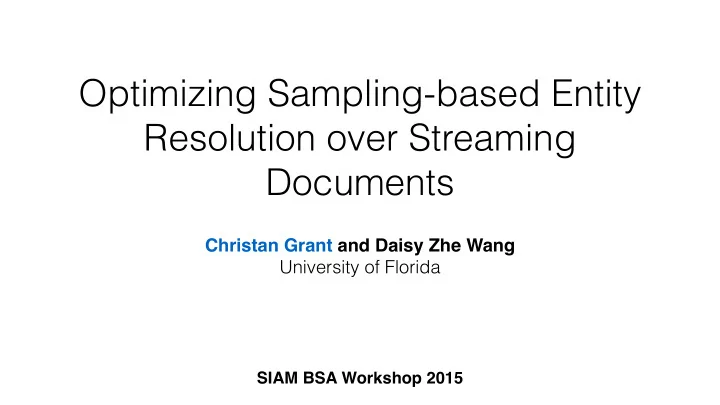

Entity Resolution Algorithm 1. Select a source mention at random . 2. Select a destination mention at random . 3. Propose a merge. 4. Accept when it improves the state. Accept!
Entity Resolution Algorithm Eventually converges . (State does not oscillate or vary)
Entity Resolution Algorithm Eventually converges . (State does not oscillate or vary) Markov Chain Monte Carlo Metropolis Hastings!
Sampling Optimizations Distributed Computations (Singh et al. 2011)
Sampling Optimizations Distributed Computations (Singh et al. 2011) Query-Driven Computation (Grant et al. 2015)
Sampling Inefficiencies
Sampling Inefficiencies 1. Large clusters are the slowest.
Sampling Inefficiencies 1. Large clusters are the slowest. • Pairwise comparisons are expensive.
Sampling Inefficiencies 1. Large clusters are the slowest. Θ ( n 2 ) • Pairwise comparisons are expensive.
Sampling Inefficiencies 1. Large clusters are the slowest. Θ ( n 2 ) Pairwise comparisons are expensive. 2. Excessive computation on unambiguous entities
Sampling Inefficiencies 1. Large clusters are the slowest. Θ ( n 2 ) Pairwise comparisons are expensive. 2. Excessive computation on unambiguous entities Entities such as Carnegie Mellon are relatively unambiguous.
Sampling Inefficiencies 1. Large clusters are the slowest. Θ ( n 2 ) Pairwise comparisons are expensive. 2. Excessive computation on unambiguous entities Entities such as Carnegie Mellon are relatively unambiguous. Streaming documents exacerbates these problems.
Optimizer for MCMC Sampling Database style optimizer for streaming MCMC.
Optimizer for MCMC Sampling Database style optimizer for streaming MCMC. This optimizer makes two decisions:
Optimizer for MCMC Sampling Database style optimizer for streaming MCMC. This optimizer makes two decisions: 1. Can I approximate the state score calculation ?
Optimizer for MCMC Sampling Database style optimizer for streaming MCMC. This optimizer makes two decisions: 1. Can I approximate the state score calculation ? 2. Should I compress an Entity?
Experiments • Wikilink Data Set (Singh, Subramaniya, Pereira, McCallum, 2011) • Largest fully-labeled data set • 40 Million Mentions • 180 GBs of data
Large Entity Sizes
Large Entity Sizes
Entity Compression
Entity Compression • Known matches can be compressed into a representative mention.
Entity Compression • Known matches can be compressed into a representative mention. • Entity compression can reduce the number of mentions ( n ).
Entity Compression • Known matches can be compressed into a representative mention. • Entity compression can reduce the number of mentions ( n ). • Compression of large and popular entities is costly .
Entity Compression • Known matches can be compressed into a representative mention. • Entity compression can reduce the number of mentions ( n ). • Compression of large and popular entities is costly . • Compression errors are permanent .
Compression Types Run Length Encoding • Run-Length Encoding • Hierarchical Compression (Wick et al.)
Early Stopping • Can we estimate the computation of the features? Singh et al. EMNLP’ 12
Early Stopping • Can we estimate the computation of the features? • Given a p value, randomly select less values. Singh et al. EMNLP’ 12
Early Stopping • Can we estimate the computation of the features? • Given a p value, randomly select less values. Singh et al. EMNLP’ 12
Optimizer Current work 1. Classifier for deciding when to perform early stopping . 2. Classifier for the decision to compress .
When should it compress?
When should it compress? Power law says there are only a small number of very large clusters.
When should it compress? Power law says there are only a small number of very large clusters. We can treat these in a special way.
When should it compress? Power law says there are only a small number of very large clusters. We can treat these in a special way. Examining the Wiki Link data set.
When should it compress? Power law says there are only a small number of very large clusters. We can treat these in a special way. Examining the Wiki Link data set.
When should it compress? Power law says there are only a small number of very large clusters. We can treat these in a special way. Exact String Match Initialization Examining the Wiki Link data set.
When should it compress? Power law says there are only a small number of very large clusters. We can treat these in a special way. Ground Truth Exact String Match Initialization Examining the Wiki Link data set.
When should it compress? Power law says there are only a small number of very large clusters. We can treat these in a special way. Ground Truth Exact String Match Initialization Examining the Wiki Link data set.
When should it compress? Power law says there are only a small number of very large clusters. We can treat these in a special way. Ground Truth Exact String Match Initialization Examining the Wiki Link data set.
When should it compress? We could make 100,000 insertions in the time it take to to compress a 300K mention cluster.
When should it compress? We could make 100,000 insertions in the time it take to to compress a 300K mention cluster. Compression must be worth it.
When should it compress? We could make 100,000 insertions in the time it take to to compress a 300K mention cluster. Compression must be worth it.
When should we approximate?
When should we approximate? • Early stopping only makes sense for clusters of medium size. • It is better to do full comparison for small and large cluster sizes.
When should we approximate? • Early stopping only makes sense for clusters of medium size. • It is better to do full comparison for small and large cluster sizes.
Recommend
More recommend